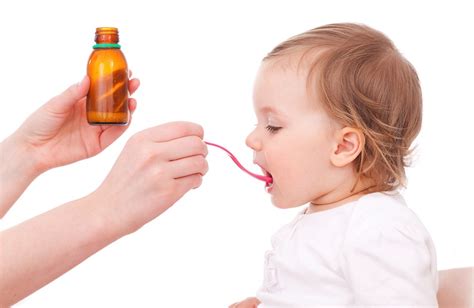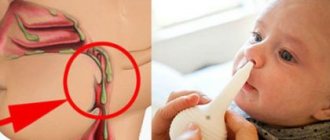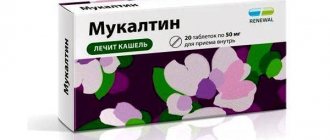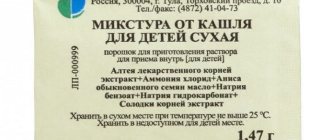Many parents are seriously concerned about a child's persistent cough for a long time. It is worth understanding that coughing is not a disease, but a natural reflex of the body that helps clear the airways of mucus. Due to incorrectly selected therapy or the characteristics of the disease, the cough may be prolonged. When a baby coughs for a very long time, it is necessary to establish the cause. A lingering cough in a baby can be of either a physiological or pathological nature. Why does my baby cough for so long? Where to examine and how to treat a child? What to do if a child has been coughing for more than a month and nothing helps?
Clinical picture of prolonged cough in children
With the help of coughing, the human body clears the respiratory tract of foreign bodies and mucus containing bacteria and pieces of food. In a baby who is sick, a large amount of sputum is produced in the nasopharynx and upper respiratory system. In this way, the body fights foreign viruses and bacteria. The cough reflex appears as a result of irritation of the villi of epithelial tissue, which are located in the bronchi, trachea and lungs.
How long does the cough last? According to medical concepts, a persistent cough is one that lasts at least 2-3 weeks. In this case, the intensity of the attacks can be any, and the cough can be wet, dry, regular, spasmodic.
Mucus is produced over a long period of time due to waste products accumulated during a respiratory or bronchopulmonary disease. This cough is also called residual - it will go away on its own and, as a rule, does not require treatment. Its characteristic features are:
- absence of other symptoms, in particular rhinitis and fever;
- the baby is active and feels well;
- the duration of coughing does not exceed three weeks;
- cough is not paroxysmal;
- little or no mucus;
- The sputum discharge is clear.
Why does my child constantly cough for more than a month?
Protracted cough in children occurs for various reasons. Coughing can be viral, bacterial or allergic in nature.
When a baby suffers from a cough for a very long time, it is often accompanied by the following symptoms: discomfort in the nose, wheezing and a feeling of heaviness in the chest. When a child coughs for a month or more, the cause may be:
- infectious and inflammatory disease accompanied by the separation of viscous exudate, pain in the throat or chest (whooping cough, sinusitis, laryngitis, tonsillitis, bronchitis, pharyngitis, sinusitis, measles, pneumonia);
- the presence of parasites in the body - before entering the gastrointestinal tract, worm larvae pass through the respiratory tract, in particular pinworms, develop in the lungs and only then migrate to another part of the body;
- fungal candidiasis;
- allergic reaction to dust, dry air, wool, plants or other irritants (most often attacks occur in the morning and at night, in addition, characteristic features are rash, shortness of breath, suffocation);
- cystic fibrosis;
- bronchial asthma;
- cytomegalovirus;
- chlamydia;
- airway hyperactivity;
- pathologies of internal organs;
- the presence of an irritant in the form of a foreign body (wet cough with a lot of mucus);
- deviation of a psychogenic nature - sometimes babies cough due to stress or psychological stress;
- tuberculosis;
- neoplasm in the chest area;
- reflux esophagitis - reflux of stomach contents into the esophagus (manifests at night; in addition to coughing, there are symptoms in the form of abdominal discomfort, heartburn, nausea and vomiting);
- disease of the cardiovascular system.
Bronchitis
Bronchitis is inflammation of the mucous membranes of the bronchi. This is a fairly serious disease, which today, with timely and correct treatment, can be cured quite successfully and without consequences.
Cough with bronchitis in a child has a number of differences:
- Severe wet cough with sputum.
- A sharp rise in temperature.
- Weakness.
- Pulmonary wheezing.
- The presence of moist rales in the lungs with a characteristic gurgling sound, which can often be heard without a phonendoscope.
- Hard breathing.
The maximum duration of cough with bronchitis is two weeks. In other cases, we can talk about complications or the fact that the bronchi have not recovered from the disease, and physical therapy is required.
Types of persistent cough
Almost everyone has heard that cough can be dry and wet. A dry cough occurs due to inflammation of the pharynx and larynx and is characteristic of a cold or its complications, such as bronchitis, tracheitis or pharyngitis. A wet cough is easier to tolerate than a dry cough, but it is accompanied by an accumulation of sputum containing bacteria. In addition to the two main types of cough, it is also classified into the following types:
- wheezing - the presence of wheezing indicates the viral nature of the disease or asthma; it can also occur if the child swallowed an object;
- croaking - this type of cough appears with inflammation of the larynx and trachea, characteristic of colds and viral illnesses;
- cough with vomiting - a strong cough and the flow of a large amount of mucus into the child’s gastric tract contributes to the gag reflex;
- nocturnal - if the cause is not bronchial asthma, its appearance is explained by the flow of exudate from the nasopharynx into the throat.
Treatment of cough in infants with medications
When treating a baby for cough, it is very important not to self-medicate the child with medications. It is better to call a pediatrician, who, after examining the little patient, will prescribe the necessary medications. This is explained by the fact that some medications not only will not get rid of the problem, but can also cause serious harm to the baby’s health.
When choosing a medicine for a 2-month-old child, first of all, you should take into account that there are two types of cough - wet and dry. For this reason, when you have a dry cough, you should select a remedy that can remove the mucus that forms in the respiratory tract. For a wet cough, the purpose of the medicine is to effectively dilute the mucus.
I would like to draw your attention to the fact that today modern medicine offers safe medicines that do not contain chemicals in their composition ( Gedelix , Prospan , Mukaltin , Alteyka ) for the treatment of cough in young children. As a rule, such preparations are characterized by a mild, pleasant taste and high efficiency. This allows you to avoid the child’s whims due to reluctance to take medications. After using such medications, the cough may intensify, which is normal when removing accumulated secretions.
Where should I get examined and which doctor should I contact if my cough doesn’t go away?
It is impossible to treat a child independently by trial and error, or using exclusively folk remedies. You should seek medical help to examine the baby and determine the true cause of irritation of the cough receptors.
The pediatrician will determine the origin of your child's persistent cough and check his overall health through various tests. In addition to a detailed diagnosis of the respiratory system, the doctor must rule out problems with the heart and gastrointestinal tract. The pediatrician may prescribe the following diagnostic measures:
- refer small patients for consultation to an otolaryngologist, allergist and gastroenterologist;
- recommend testing for various allergens;
- sometimes a CT or MRI is required;
- if tuberculosis is suspected, bronchoscopy will be prescribed;
- issue a referral for laboratory testing of sputum (material is collected in the morning on an empty stomach before hygiene procedures);
- in case of inflammatory and allergic reactions of the body, a general analysis of blood and urine is performed;
- a referral for radiography is issued for suspected bronchitis, pneumonia or tuberculosis.
Treatment options
If sputum is difficult to separate, medications are prescribed to thin it and expectorate it. The child's respiratory muscles are still poorly developed, so mucus is retained in the larynx.
If sputum is discharged productively, then cough suppressants are not recommended, since mucus accumulates in the lower respiratory tract. Mucolytics thin only thick mucus and remove it naturally. The following remedies are considered the most effective:
- Lazolvan;
- Bromhexine;
- ACC;
- Fluimucil;
- Ambrobene.
Expectorants include drugs with reflex and resorptive action. The former quickly thin out mucus and increase sputum production. These are herbal remedies based on plantain, elecampane, anise, thyme and other herbs. They are rarely prescribed to children under 3 years of age, as breathing obstruction may develop.
Resorptive medications for a wet cough in a child include:
- Mukaltin;
- Pertussin;
- Doctor Mom;
- Gedelix;
- Overslept.
They help reduce the viscosity of pathological secretions and remove them from the bronchi and lungs. It is more convenient to use syrups, and the tablets are ground to a powder and diluted with water.

Not all medications are suitable for infants. A newborn cannot cough up the accumulated fluid, so it is better to do inhalations with Lazolvan, Ambrobene, Fluimucil. The youngest patients can take Gedelix. From three months Prospan is recommended, and from six months - a dry formula based on plants.
For severe diseases of the respiratory system, Ascoril is prescribed to one-year-old children and older children. This is a stronger remedy. It effectively thins mucus and promotes coughing. From the age of two, Erespal is used with a dosage corresponding to the weight of the small patient. Medicines are prescribed by a doctor regardless of age. Therapeutic massage helps with expectoration of mucus.
Antibiotics are used only when the disease is caused by bacterial inflammation and is accompanied by high fever. Most often used:
- Sumamed;
- Flemoclav;
- Digital
There are folk remedies to help cope with the disease. Before using them, consultation with a specialist is also necessary.
Typically, drug therapy is combined with alternative medicine. At home, milk with honey, butter and soda, as well as badger fat, are used for oral administration. Another good remedy is milk with figs. Two dried fruits are enough per glass. Boiling time is approximately 15 minutes.

Black radish syrup with honey helps a lot. The core of a large vegetable is removed with a spoon and filled 2/3 with honey. After 3 hours you can give it to children. It is recommended to drink this remedy several times a day.
Traditional methods of treatment include herbal decoctions, syrups, and drinks. You need to take 50 g of plantain leaves and pour 1 liter of boiling water. Leave for at least 4 hours, the recommended dose is 2 tablespoons 4 times a day.
In order to prepare the syrup you will need: mix raspberries (1 kg) and viburnum (1 kg) with sugar (0.5 kg). The mixture is infused for several hours, squeezed and diluted with 2 glasses of milk. Children are treated with this remedy - 3 times a day, 1/2 cup, the drink should be warm.
Non-traditional methods of treatment include a drink made from banana and cocoa. First, the fruit is mixed with powder (1 teaspoon), and then poured with hot milk (1 glass).
External use includes lozenges, compresses, and rubbing. Goose, bear, and badger fats are used.

Inhalations with herbs and baking soda help cure a raw cough. There are many more home treatments, but before using them you should make sure that the child is not allergic to the ingredients. Complex therapy will help you cope with diseases faster and avoid complications.
What is the danger of a prolonged cough?
If your child has been coughing for more than a month, or worse, for 2–3 months, you should immediately consult a doctor or find another pediatrician. A prolonged cough in a child is dangerous because it can become chronic. Of particular danger is a hysterical debilitating dry cough in a baby or with too viscous mucus. The latter must be liquefied, since its drying out threatens severe attacks in which a small child can suffocate. You should not hesitate to go to the doctor in the following situations:
- the amount of exudate increased;
- sputum has acquired a yellow or greenish tint;
- coughing attacks occur more frequently;
- the child is choking;
- heat;
- wheezing or other sounds are heard during coughing;
- the baby refuses to eat and loses weight;
- weakness, drowsiness, capriciousness of the child.
If a residual cough after a cold in a child does not go away, a doctor’s consultation is necessary. Perhaps the immune system has weakened, and a new virus has entered the body, or the previous disease was not fully cured. It is unacceptable to change medications at your own discretion, as this can harm the body. Antitussives should absolutely not be taken simultaneously with expectorants - this can cause the development of pneumonia.
If a cough does not go away for two weeks or more in a child who has had bronchitis, this indicates irritation of the larynx, which threatens the development of chronic pharyngitis or bronchial asthma. A persistent cough in children lasting two months is dangerous, as it contributes to vomiting and hemoptysis.
Non-infectious cough in infants
In answer to an exciting question - how to treat a cough in a 2-month-old child, without fever, I would like to note that such symptoms do not always indicate the presence of a disease. The most common cause of such a cough, which is not accompanied by an increase in body temperature in an infant, is an allergy. In this case, anything can be an irritant - food products consumed by a breastfeeding mother, formula, pollen, lint, wool. As a rule, cough caused by allergies appears at night and in the morning . If such a symptom occurs in a baby, it is necessary to consult a specialist and undergo a series of tests that will help identify the irritant.
Diagnosis and treatment of cough
How to cure a prolonged cough if nothing helps? Proper treatment of a cough that does not go away for a long time requires determining the cause. Diagnosis consists of a series of studies and determination of the disease by the method of exclusion based on test results and expert opinions.
Once the cause has been identified, you can use not only medical therapy, but also physiotherapeutic procedures, as well as traditional recipes. The main condition for successful therapy is the removal of mucus from the respiratory system.
Medicines
The selection of drugs depends on the nature of the disease. If the cause is bacteria, the baby will be prescribed antibiotics, and antiviral medications will be used against viruses. In addition, the pediatrician will recommend products to strengthen the body's defenses and vitamin preparations.
Mucolytics and expectorants will help make the sputum less viscous. In the case of an allergic cough, in addition to eliminating the irritant, the child will be given a prescription with an antihistamine. For whooping cough, children are prescribed anti-cough medications, and the pediatrician may also recommend them to take before bed so that the baby can sleep normally (these medications are prescribed with caution by doctors for children under one year of age). Drugs used in the treatment of persistent cough:
- antibiotics and antiseptics: Amoxicillin, Azithromycin, Hexoral, Augmentin, Ceftriaxone, Cifazolin;
- antitussives: Libexin, Panatus, Robitussin, Omnitus, Deslim, Sinekod;
- expectorants: Gedelix, Bronholitin, Prospan, Gerbion, Ambrobene;
- mucolytic: Ambroxol, Mucaltin, ACC, Doctor Mom, Bromhexine.
Inhalations and physiotherapy
Mothers who have experienced a persistent cough for the second or third time often decide to buy a nebulizer. This device allows you to do therapeutic inhalations right at home, rather than visiting a medical facility.
With the help of inhalations, medications are delivered directly to problem areas. You can also use the old proven method - cover the child with a towel over the saucepan so that he can breathe in the steam. The following are used as a remedy:
- water with the addition of eucalyptus or pine oil;
- the antibacterial effect will be provided by adding Miramistin, Dioxidin, Gentamicin, Fluimucil, Chlorophyllipt to the water;
- water after boiling potatoes;
- Sinupret, Lazolvan, Ambrobene, Pertussin, Fluimucil, Mucaltin are used to remove sputum;
- brewed infusions from pharmaceutical breast preparations;
- Borjomi or other mineral water;
- to reduce inflammation, Rotokan, Tonsilgon, Malavit, Calendula, Propolis, Eucalyptus are added to the water;
- in difficult cases, the doctor may recommend inhalation with the hormonal drug Berodual.
In addition to inhalation, the baby can be bathed in warm water with the addition of medicinal herbs. In addition, the pediatrician can recommend effective electrical procedures: quartz tube, UHF, laser heating, electrophoresis, darsonval. These procedures are indicated if the cough lasts two weeks or more.
Breathing exercises and drainage massage will help cure a cough. They make breathing easier, promote natural coughing up of exudate, increase the vital capacity of the pulmonary system, and eliminate bronchospasms.
Folk remedies
In addition to medications and procedures, it is recommended to treat a persistent cough in a child using traditional methods. Supplementing basic treatment with alternative medicine has a beneficial effect on the immune system and speeds up the healing process. The only thing is that you should be careful with products and plants if they have not been used before, because it is possible that the child may be allergic to them.
Traditional medicine should also be used in case of residual cough, which goes away on its own within 2 weeks. With its help, you will be cured faster. Effective folk recipes:
- Banana puree - mash the fruit with a fork or in a blender, adding a little hot water. Give to baby several times a day.
- Black radish is an effective remedy used by our grandmothers. The root vegetable promotes mucus separation and makes cough productive. The tail of the radish is cut off and a hole is made, after which the vegetable is filled with honey. The released juice is given to the baby three times a day, one teaspoon.
- Gargling helps remove accumulated mucus with bacteria and food debris. You can gargle with boiled warm water with the addition of calendula tincture, sea salt or essential oils (arborvitae, cedar, pine, eucalyptus, sage, tea tree).
- A remedy with aloe not only helps eliminate cough, but also strengthens the child’s immune system. A plant three years old or older is suitable for this recipe. The pulp of the bottom leaf is crushed and mixed with honey at a ratio of 1:1. The medicine is given four times a day, a teaspoon.
A child has a cough for 2 months, how to treat it, he has no fever
Young parents often ask themselves a question that is quite relevant to them: a child has a cough for 2 months, how to treat it, without fever.
Before taking any steps, you should consider that coughing is a protective reaction of the human body to various irritants.
That is, it can be caused by both pathogenic organisms, foreign bodies, and a banal reason in the form of dry indoor air. Therefore, first of all, you should find out the nature of the cough, after which you can take the necessary measures.
Let's sum it up
As can be seen from the presented material, a cough in a 2-month-old child, without fever, is not as serious a problem as it might seem at first glance.
With the right approach, you can quickly get rid of it. The most important condition is to drink plenty of fluids, maintain the necessary humidity and ventilate the room.
If the cough is persistent and lasts more than two weeks, you should consult a doctor to find out its causes.
Source: https://lechu-kashel.ru/kashel-u-rebenka-2-mesyatsa-chem-lechit-bez-temperatury/
Komarovsky's advice
Komarovsky considers it normal if a dry cough becomes wet after a couple of days, with sputum separated, and the cough goes away within three weeks. In his opinion, before treating a lingering cough, it is necessary to find out the cause and undergo treatment under the supervision of a specialist.
If a child has been coughing for one month or more, self-medication is unacceptable. The baby’s health condition can not only deteriorate and cause complications, but also contribute to the development of many chronic ailments. In addition to the prescriptions prescribed by the doctor, parents must create a favorable environment to speed up the healing process of their child. Komarovsky recommends adhering to the following rules:
- air humidification, timely cleaning and ventilation of the house are important factors in the treatment of a baby that cannot be ignored, even if the child is healthy;
- drinking plenty of fluids helps to liquefy and remove mucus from the respiratory system;
- in the treatment of prolonged cough, inhalations with the addition of drugs or herbal supplements are used.
Pediatrician, allergist-immunologist, graduated from Samara State Medical University with a degree in Pediatrics. Read more »










